- Home
- Karen Traviss
Coalition's End Page 5
Coalition's End Read online
Page 5
Vectes—unspoiled, fertile, picturesque—had waited out the war, cut off from the horror on the mainland since before the global Hammer strike. The small population carried on and kept the mothballed naval base ticking over. But they’d never seen a grub, never had to run for their lives, and never had to fear the vibrations under their feet that warned a Locust attack was coming. Hoffman decided that if they lobbed bricks at him and Prescott now that the glowies had invaded then he couldn’t really blame them.
The harbor was a horseshoe shape, framed by a gravel road that ran down to the slipway. Hoffman could see a small crowd waiting by a pickup truck. A woman in overalls got out of it and stood blocking the Packhorse’s path, forcing it to slow and stop.
“Looks like the missus,” Bernie said, speeding up as if she was going to intervene.
“Anya can handle it.” They’d almost caught up with Prescott now. “The civvies trust her.”
“I promised her mother that I’d look out for her.”
“And you have. That’s why she’s in command of the garrison now. Back off, Bernie.”
Prescott reached the Packhorse before them, but he had the sense to stand back and let Anya deal with the widow. Hoffman could see Anya talking to her, making calming hand gestures while Marcus blocked the Packhorse’s tailgate. More locals began coming out of the waterfront workshops and houses to see what was happening.
Anya was doing her best in a situation where there could be no right words to sort things out, ever.
“I want to see him,” the woman kept saying. “I want to see my husband.” She was dry-eyed but she had that over-controlled, slightly shaky voice that said she was about to lose it completely. “I want to see Leon. I’ve got a right.”
She went to open the Packhorse’s rear door. Anya put a careful hand on her arm.
“Let’s do this inside, Mrs. Whellan,” she said quietly. “Not out here.”
“No, I want to see him now!” the woman snapped. “Not laid out in some damned warehouse. It’s nothing to you, is it? Nothing. You see it every day. It’s just another slab of meat to you.”
Marcus did one of his slow head turns and faced the onlookers. “Okay, time to give Mrs. Whellan some privacy, people.”
Maybe there were some right words after all. The crowd—about seventy locals now, a single animal with one reaction—seemed to hold a communal breath for a second and then turned away and dispersed in silence. Marcus had an effortless, reasonable authority that made people listen.
He put his hand on the door latch. “Are you ready, ma’am?”
Mrs. Whellan nodded. Bernie moved in and helped Marcus pull the body-bag out on the tailgate as gently as possible, but it still looked as dignified as hauling a sack of potatoes. It was what the widow wanted, though. Marcus was right. You didn’t argue with someone in that state.
“Ma’am,” Bernie said, “there’s some blood. Only fair to warn you.” She looked into the woman’s face but didn’t get a reaction. “You can say stop, any time you want.”
Marcus pulled the zip open. Mrs. Whellan turned her head away and took a few moments to force herself to look.
“Oh.” She put her hands to her mouth. “Oh God.”
Prescott picked his moment to be statesmanlike. “I’m very sorry for your loss, ma’am. We’ll do everything we can to—”
“No, it’s not him,” the woman interrupted. “That’s not Leon. It’s not my husband.”
Hoffman cringed.
“But he was working on your land,” Anya said.
“Yes, but that’s Daniel. Leon’s cousin. Where’s Leon?”
Mrs. Whellan was all blank confusion for a second or two. Then she burst into tears, knees sagging as if she was going to collapse. Anya caught her arm and steered her away to a nearby house to sit down on the porch. Hoffman tried to imagine what it felt like to be told a loved one was dead and then find it was another member of the family instead. Relief never really got a look in.
“Yeah, that went really well,” Baird said, sighing. “Now we’ve got to find another housewife to traumatize.”
Hoffman had had enough of hearts and minds for the day. He still had a field of stalks to examine. “Anya, call me back when Gavriel gets a town meeting set up,” he said. “The rest of you—with me. Dizzy should have that rig in place by now.”
They trudged back to the Ravens. Sorotki, Gettner, Mitchell and Barber were playing cards in KR-80’s crew bay, unfazed in that seen-it-all way of Raven crews.
Sorotki looked up as they approached. “How are they taking it?”
“Wrong stiff,” Baird said.
“You’re just too sentimental.” Sorotki got to his feet and collected the cards from the rest of the crew. “I don’t want to make your day plummet downhill any faster, Colonel, but there’s another farmer going ballistic. The one whose cows got fragged.”
“I’ll talk to him,” Prescott said. “The colonel’s got his hands full right now.”
Hoffman’s reflex reaction was to wonder if it was another maneuver, but a helpful gesture was sometimes just that, nothing more. He’s got me. He’s made me doubt every damn thing I see, and he doesn’t have to lift a finger now to do it. Bernie must have seen him twitch, because she gave him a warning nudge in the back.
“Thanks, Chairman,” Hoffman said, deciding he was getting too tangled up in this. “I’m not good with farmers.”
His working relationship with Prescott had hit rock bottom when he’d stolen the data disk, and now it was scraping along in a kind of frosty neutral gear. Prescott knew he had it. He also seemed to know that Hoffman hadn’t cracked it yet. Maybe that amused him.
“Just walk away, Vic,” Bernie whispered. She knew him far too well. “Okay? Just focus.”
As Sorotki came in to land at the stalk site, Hoffman spotted Dizzy’s grindlift derrick making her way down the narrow two-lane approach road. Prescott leaned past Cole and Bernie to get Hoffman’s attention.
“That brown patch around the stalks,” he said. “What’s that?”
Hoffman turned to look down. Prescott didn’t mean the churned soil. The pasture around the stalks looked as if it had been scorched by weed killer. The grass was brown and limp, a pool of dead vegetation that extended out from the stalks by a couple of meters. It hadn’t been like that when they left.
“Maybe it’s from the polyp spatter,” Hoffman said.
Prescott shook his head. “Then we’d see patches, not a radial pattern. Corporal Mitchell? Let’s get some pictures of that.”
Mitchell took the recon images in silence and nobody said anything for a while. The Raven landed and Sorotki had shut down the engines before anyone even moved.
Marcus leaned back in his seat and stared out in the direction of the stalks. For once, even Prescott looked visibly troubled. In a world that had lost the science and technology it had taken for granted, inexplicable things now scared Hoffman more than he was willing to let on. There were no more Adam Fenixes left to step in and invent a solution.
“So the stalks kill pasture,” Hoffman said. “That could be an even bigger problem than the goddamn polyps.”
CHAPTER 3
Would Prescott do it? If the Hammer of Dawn could still incinerate every city on the planet, would he target Vectes to get rid of the Lambent? He wiped out most of Sera to try to stop the Locust—and I hear he took that decision with Hoffman. Men who can see millions of lives as collateral damage aren’t really worried what happens to a handful of farmers.
(Pelruan resident, expressing doubts to Mayor Lewis Gavriel)
THE JACKSEN FARM, ONE HOUR AFTER THE STALK INCURSION.
It was a damn small gate, just tractor-sized, and Betty was broad in the beam. Something had to give. And it wasn’t going to be Betty.
Dizzy Wallin slowed his beloved grindlift rig to a crawl and sized up the terrain before bringing her to a halt. A small, miserable-looking guy was sitting on the tailgate of a pickup parked in the field. When Betty’s sh
adow fell across him he glanced up, looking like a depressed weasel.
Dizzy opened the side window and leaned out as far as he could. He loomed two meters above the man. There was no way to look nice and reassuring while driving Betty.
“Reckon I’m gonna have to roll right over the fence, sir.”
The miserable guy stood up with his hands thrust deep in his pockets. “Go ahead,” he said. “It’s not like things can get any worse.”
“I’ll give you a hand repairin’ it later.”
“That’s nice.” His face didn’t change. “Thanks.”
Dizzy released the brake and rolled forward. He didn’t even feel a bump as Betty crushed the flimsy wooden gate and the hedge to either side of it. Now he was face-to-face with the first complete stalks he’d seen. Goddamn, those things were big. They didn’t look much like the chunks that Dom and Marcus had brought back from a wrecked ship a few weeks ago.
He’d heard all the stories about the ones that sank the Indie imulsion rig, though. Where the hell did they stow all those polyps? He’d served on imulsion tankers. It still twanged a nerve in him.
Prescott stood with his back to the stalks, talking to Hoffman and Lennard Parry as if they were all just doing a nice spot of sightseeing at a monument. Bernie stood a few meters away with that scruffy hound of hers on a tight leash.
The Chairman was wearing what Bernie called his lord of the manor rig—rubber boots, oilcloth jacket, and woolly jumper—and Dizzy caught her eye for a moment. She winked at him and did a subtle nod in Prescott’s direction. Just look at him. Yeah, folks’ breeding always showed on their faces, no matter how much cow dung they had on their boots. Prescott had pedigree.
There’d been a time when Dizzy had been sure he’d shoot Prescott if he ever met the asshole. This was the man who’d told the world it had three days to get to Jacinto before he vaporized the rest of Sera. This was the man who’d caused the deaths of millions and made Dizzy and his family into Stranded.
Not Hoffman. I know he was top brass when it happened, but I don’t blame that man, no sir.
Dizzy found he could stomach Prescott because his girls needed him to. A man really could endure anything for his kids.
“Hey, Diz!” Parry signaled to indicate where he wanted Dizzy to pull up, and walked across to meet him. “Feeling adventurous?”
Dizzy gave him a thumbs-up. “You point me to the spot, Staff, and I’ll make a damn big hole in it.”
“Okay, we need to see how far down these stalks go.” Parry was clutching a small monitor and a coil of cable in his arms. “Whether they have roots. What kind of rock they’ve come through. That sort of thing.”
“You got it. Let’s drill.”
“See if we can uproot one of ’em first so we can do a test bore underneath. Help me get some chains on the one on the left.”
“Oughta be like pullin’ up daisies.”
“I wish.”
Dizzy climbed down out of the cab. The grass beneath him was brown and dead. “So the weed killer didn’t work, huh, Len?”
“Not guilty.” Parry took another look at the dead grass. “Maybe we ought to hose down our boots when we’re done. I don’t like the look of that.”
Marcus wandered over to them with a bundle of thick twigs tucked under his left arm. He was whittling one to a point with his knife.
“Just an experiment.” He stabbed the twigs into the ground at regular intervals around the edge of the brown patch. “Check these markers later and see if it’s still spreading.”
“Whatever it is, it’s toxic,” Parry said. “But lots of plants pump out poison that kills other species around them. Walnut trees, for a start. Can’t plant clover or tomatoes within twenty meters of ’em.”
“Fucking Lambent walnuts,” Marcus muttered. “That’s all we need.”
He walked away and stood guard with his Lancer cradled in his arms like he was expecting more polyps. Prescott joined him, which was kind of odd; they were never social. They just stood there a meter apart, avoiding looking at each other.
“You think that piece o’ pantie elastic’s gonna hold, Len?” Dizzy asked.
Parry winked. “You sure that oversized junker of yours can handle that chain?”
“Don’t you let Betty hear you say that. She’s real sensitive about her weight.”
“I don’t know how heavy that stalk’s going to be. You might need to weld her back together again.”
“Only one way to find out. Hitch her up and see what breaks first.”
Dizzy trusted Parry’s common sense. The man was a Logistics Corps staff sergeant, and that meant he was one of a special breed. His ragbag crew of engineers and tradesmen, cobbled together from the survivors of three support regiments, had kept Jacinto powered, watered, fed, and housed for fifteen years. They rebuilt the city every day after the grub attacks and never bitched about it—well, not often. No, uprooting a few stalks wasn’t going to bother Parry, not one damn bit.
And he always treated me right. Yeah, he remembers way back. And so do I.
Parry shackled the chains to the rig’s winch and Dizzy climbed back up to the cab. Once he shut the door with that satisfying clunk, he was in another world. No goddamn thing could touch him. He sat behind a steering wheel meters off the ground and far from the chaos beneath his wheels, the master of all he surveyed thanks to Betty. He probably wasn’t half as safe as he liked to think, but it still made him feel good.
Ah, Betty. We’ve been together a damn long time too. Ain’t gonna damage you if I can help it, sweetheart.
He loved this rig. Folks said it was downright unhealthy to love a machine, but she’d never let him down, she’d never lied to him, and she’d saved his ass more than once. That was a lot more than he could say for flesh and blood.
“It’s okay, darlin’.” He patted the dashboard. “This might sting a bit, but all you gotta do is pull. Then we can see what’s under that grass. You ready? Okay. Easy does it, sweetie…”
He started the engine. Betty rumbled into life with a steady vibrating pulse as good as a heartbeat. Up here, he wasn’t a Stranded bum or a drunk. He was a derrick driver, a combat engineer, the man who literally dug you out of the shit. Gears depended on him.
Dizzy hadn’t seen his life working out like this, but he reckoned nobody was where they planned to be these days. Being alive was the only measure of success worth a rat’s ass. He jiggled his shirt pocket to feel the reassuring slop of liquor in his flask and reminded himself to start brewing another batch that evening. Potatoes. Damn, those made some real fine hooch.
Dizzy gave Parry a thumbs-up and waited for him to get clear. The winch mechanism whined. Then he felt a jolt as the cable took up the slack. Metal groaned. He held his forefinger on the motor control as Betty began dragging the stalk out like a weed, swiveling on his seat to try to catch a glimpse in the wing mirrors.
“How we doin’, Len?” he called.
“It’s starting to give.” Parry was looking to one side of the field, getting hand signals from one of his team. He raised his arm and beckoned Dizzy forward. “Just a couple of meters, Diz… that’s it… come on… steady.”
Dizzy slipped the clutch and Betty crept forward, creaking and rumbling. Things were going fine, but then he felt the engine start to struggle. He put his foot down. Betty was starting to churn soil now. He could feel the tires losing purchase. On the dashboard, the winch warning light lit up red.
“Diz, slacken off!”
“Whoa—goddamn!” Dizzy didn’t drop the revs fast enough and for a second he felt he was treading air. Then there was a crack loud enough to hear over the engine noise, and Betty lurched forward. Something smashed against the rig’s tail panel like a hail of bricks. The chain had broken.
“Hang on, Diz—the stalk’s snapped at the base,” Parry yelled. “Shut her down.”
Dizzy scrambled down from the cab to inspect the damage. The stalk had broken clean off just below ground level, but most of it
was still rooted firmly in the soil. Betty’s winch assembly dangled from its mounting, held in place by a couple of bolts. Apart from that she was in one piece.
“Sorry, honey.” He patted her as the others clustered around the stump to examine it. Marcus bent to pick up a fist-sized chunk of stalk. The broken surface was gray and honeycombed with holes, a lot like pumice but much harder and heavier.
“Now that’s different.” Baird took it off him and turned it over in his palm. “The internal structure, I mean. Last one we chopped up was more like a tree trunk. Yeah, my money’s on them evolving.”
Prescott looked at Baird as if he’d discovered gravity or something. “Or perhaps it’s a mature one.”
“Then why do they look different as soon as they come out of the ground?”
Prescott nodded as if that made sense somehow. “See if you can cut some sections out of it.”
“You want a souvenir paperweight?” Baird asked. Damn, he was a rude asshole, even to the Chairman. “Because that’s all it’s good for. We don’t have any way of analyzing except to look at it under Doc Hayman’s microscope. She’ll love that. Not.”
For some reason Prescott didn’t give Baird an earful. He didn’t look down his nose at him, either. There was something going on, something weird, and when Dizzy looked in Hoffman’s direction, the Colonel was watching the pair of them like an impatient buzzard who thought his dinner was taking too long about dying.
“You never know, Corporal,” Prescott said. “Our Gorasni friends might have hidden talents when it comes to analytical skills. I’d still like some specimens. And some of the dead grass, too.”
“If you’re ready, sir, I’m gonna start drilling,” Dizzy said. “Give Betty some elbow room. Might be a lot of grit flying around.”
Betty could drill a vertical shaft wide enough to drop a two-man grindlift. A little bit of granite wouldn’t bother her. Dizzy lined up the telescoping drill over the stump, hit the starter, and felt a kick as the bit engaged with the ground.

 Halo: Glasslands
Halo: Glasslands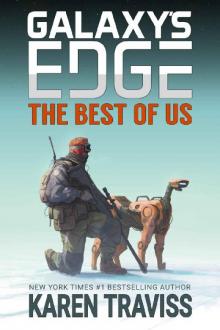 The Best of Us
The Best of Us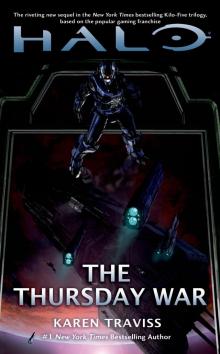 Halo: The Thursday War
Halo: The Thursday War Ally
Ally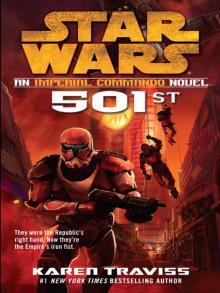 501st: An Imperial Commando Novel
501st: An Imperial Commando Novel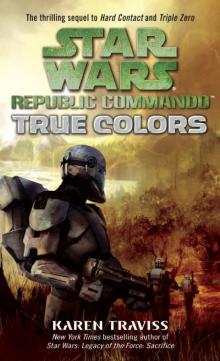 True Colors
True Colors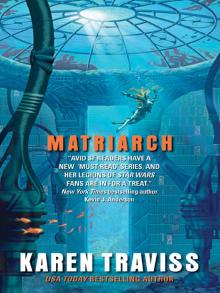 Matriarch
Matriarch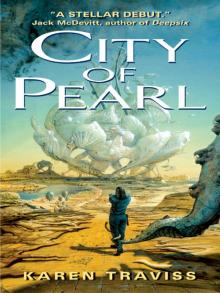 City of Pearl
City of Pearl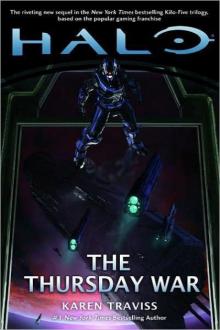 The Thursday War
The Thursday War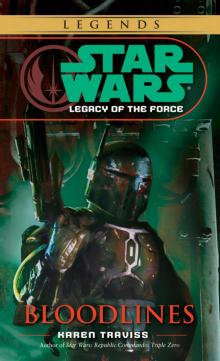 Bloodlines
Bloodlines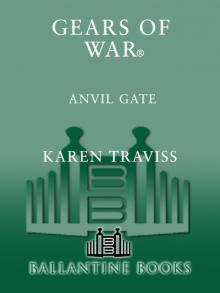 Gears of War: Anvil Gate
Gears of War: Anvil Gate Crossing the Line
Crossing the Line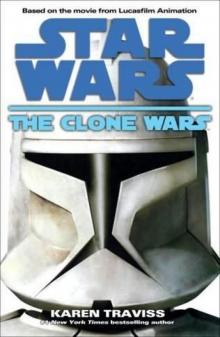 Star Wars - The Clone Wars 01
Star Wars - The Clone Wars 01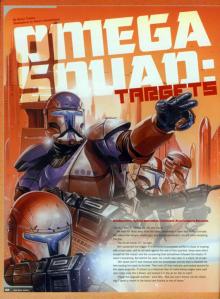 Omega Squad: Targets
Omega Squad: Targets Halo®: Mortal Dictata
Halo®: Mortal Dictata Hard Contact
Hard Contact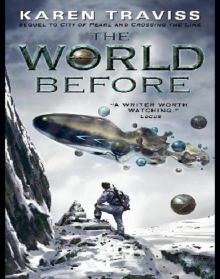 The World Before
The World Before Order 66
Order 66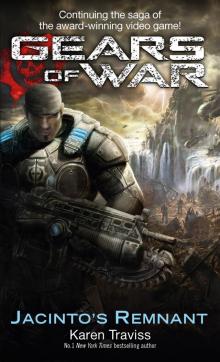 Gears of War: Jacinto's Remnant
Gears of War: Jacinto's Remnant Sacrifice
Sacrifice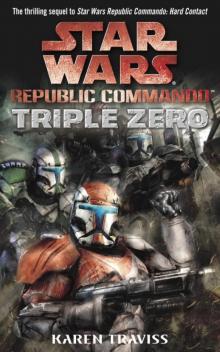 Triple Zero
Triple Zero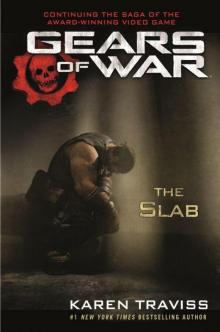 Gears of War: The Slab (Gears of War 5)
Gears of War: The Slab (Gears of War 5)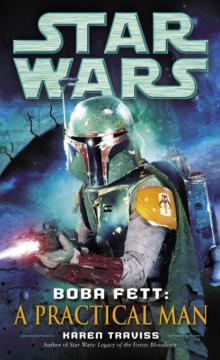 NEW JEDI ORDER: BOBA FETT: A PRACTICAL MAN
NEW JEDI ORDER: BOBA FETT: A PRACTICAL MAN Going Grey
Going Grey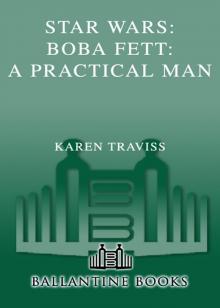 Star Wars: Boba Fett: A Practical Man
Star Wars: Boba Fett: A Practical Man Revelation
Revelation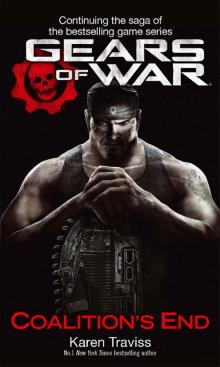 Coalition's End
Coalition's End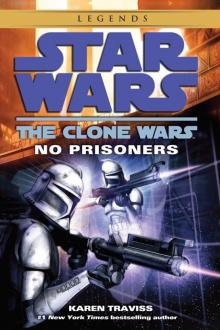 No Prisoners
No Prisoners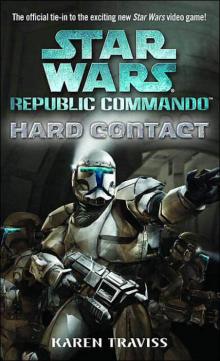 Star Wars Republic Commando: Hard Contact
Star Wars Republic Commando: Hard Contact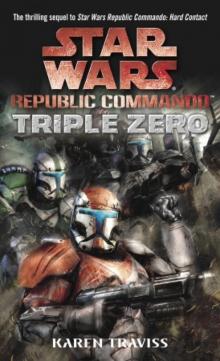 Star Wars: Republic Commando: Triple Zero rc-3
Star Wars: Republic Commando: Triple Zero rc-3 The Clone Wars
The Clone Wars The Clone Wars: No Prisoners
The Clone Wars: No Prisoners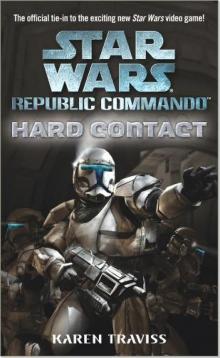 Star Wars: Republic Commando: Hard Contact rc-1
Star Wars: Republic Commando: Hard Contact rc-1 Judge
Judge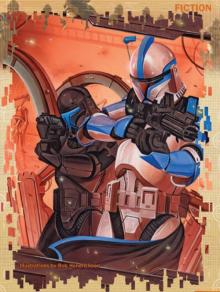 Omega Squad: Targets rc-4
Omega Squad: Targets rc-4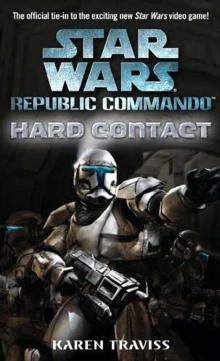 Star Wars - Republic Commando - Hard Contact
Star Wars - Republic Commando - Hard Contact